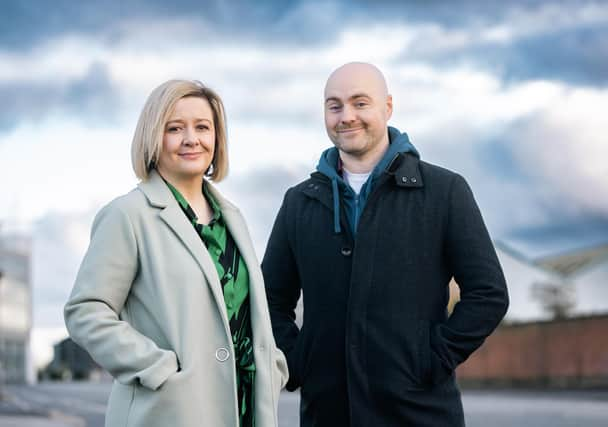Comedian Paddy Raff supports Epilepsy NI's counselling service


The charity Epilepsy Action Northern Ireland is now offering a free counselling service that has the potential to support the 20,000 people currently living with epilepsy in the province, their families and carers.
With the help of its specialist counsellors, the charity believes the Talk and Support service can be the first point of contact for local people as they embark on their epilepsy journey, especially as waiting lists in Northern Ireland are the worst in the whole of the UK.
Advertisement
Hide AdAdvertisement
Hide AdPaddy Raff said: “As someone with a sibling with epilepsy, I am supporting Epilepsy Action Northern Ireland’s counselling service as it is something me and my family could really have benefited from when Sarah first acquired a brain injury.
“Back in the nineties there was no internet, so finding out information or people in similar situations wasn’t always easy.
"I know there are more online resources now, but they lack a personal touch. Putting a face or voice to conversations and being able to speak to a real person and not just looking stuff up is so beneficial and having facts that can be backed up with science is very important to ensure you are getting the right advice.”
The comedian added: “Although as a family we are able to manage Sarah’s needs, epilepsy is an ever-present threat, and my mum, who is Sarah’s primary carer, needs to keep on top of it.
Advertisement
Hide AdAdvertisement
Hide Ad"A counselling service such as this is great to help us understand more about epilepsy and to talk through what we were experiencing and what help was available.”
Epilepsy is a condition that affects the brain, causing repeated seizures
Anyone can have a one-off seizure, but it doesn’t always mean they have epilepsy
People are usually only diagnosed with epilepsy if their doctor thinks there’s a high chance they could have more seizures
Advertisement
Hide AdAdvertisement
Hide AdEpilepsy can start at any age and there are many different types.
Some types last for a limited time, but for many people, epilepsy can be a life-long condition.
The main symptom of epilepsy is repeated seizures, which are sudden bursts of electrical activity in the brain that temporarily affect how it works.
Seizures can affect people in different ways, depending on which part of the brain is involved.
Advertisement
Hide AdAdvertisement
Hide AdSome cause the body to jerk and shake (a "fit"), while others cause problems like loss of awareness or unusual sensations. They typically pass in a few seconds or minutes.
The main treatment for epilepsy is anti-seizure medications (ASMs) or the older term anti-epileptic drugs (AEDs). The medicine doesn’t cure epilepsy, but helps to stop or reduce the number of seizures, or make them less severe.
Some people need to try a few medicines before they find one that works well for them. And some people need to take two or more epilepsy medicines together.
If epilepsy medicine doesn’t work well for someone, other types of treatment include brain surgery, another type of surgery called vagus nerve stimulation, and a special diet called the ketogenic diet.
Advertisement
Hide AdAdvertisement
Hide AdThe roll-out of the counselling service comes not only at a time when it can take between four to five years for an urgent referral in neurology, it also dovetails into the objectives laid out in the Northern Ireland Executive’s 10 Year Mental Health Strategy, launched last year.
This strategy seeks to create a vision for Northern Ireland society by promoting emotional wellbeing and positive mental health for everyone, by supporting recovery, and reducing stigma and mental health inequalities.
Carla Smyth, services and projects manager for Epilepsy Action Northern Ireland said: “Northern Ireland’s waiting lists are dire.
"Waiting up to five years for an urgent referral to see a neurologist is not acceptable for local people diagnosed with epilepsy and their families.
Advertisement
Hide AdAdvertisement
Hide Ad"At Epilepsy Action Northern Ireland, we are delighted to offer this free counselling service as it offers hope to people who can’t get instant help from their GP and who maybe can’t afford to pay for a private appointment.”
She added: “Being diagnosed with epilepsy can be frightening, and people often don’t know where to go to seek help.
"Our aim is that our qualified and specialist counsellors will be the first point of contact for people and give them advice, support and reassurance that they are not alone and support them longer term as they learn to live with an epilepsy diagnosis.
“Feedback from participants that have engaged the 8-week programme reported that the sessions helped them “explore their emotions and gain a greater level of acceptance by realising that they can still live a full life albeit in a different way”.
Advertisement
Hide AdAdvertisement
Hide AdPeople can seek support that suits them and their needs, with professional counsellors offering faster access to one-off session or blocks of more intensive counselling support groups.
The counselling support programme is free and confidential and can be accessed online and by telephone, through self-referral on the EpilepsyAction.org.uk website or by calling 028 9018 4015.